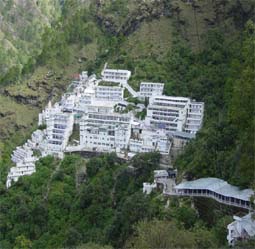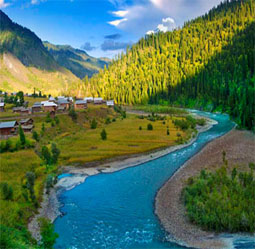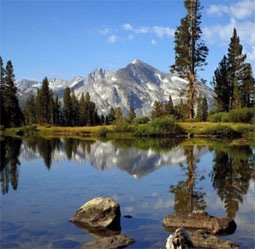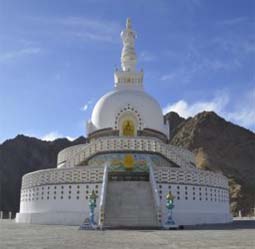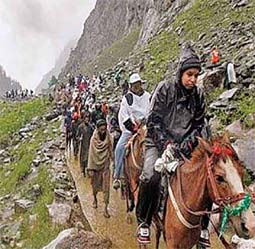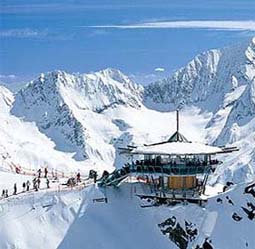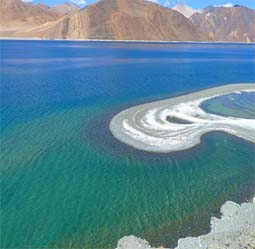Jammu
Bahu Fort
Bahu Fort is among the popular sightseeing attractions of the city of Jammu, which was built by Raja Bahulochan over 3,000 years ago. The fort was later restored during the 19th century by the Dogra rulers. Other notable attractions of the fort include Bahu Temple, a shrine dedicated to Goddess Kali.
The fort stands on a plateau overlooking Tawi River with the surroundings developed into a well laid garden known as Bhave ki Bahu. Bhave ki Bahu is laid on the lines of the Mughal Gardens from where tourists can have a birds eye view of Jammu city.
An ancient fort is placed within the thick sandstone walls and features eight octagonal towers with enclosures to house guards. There were several reconstructions from time to time in the fort; the last was done by Maharaja Gulab Singh in the 19th century.
Nandini Wildlife
Nandini Wildlife Sanctuary is a popular site among wildlife enthusiasts that houses various species of pheasants. The reserve was established in an area of thick forests along with wildlife and is situated 28 km from Jammu.
A popular dwelling of pheasants, the sanctuary is home for avifauna species that include Indian mynah, red junglefowl, cheer pheasant, blue rock pigeon, Indian peafowl and chakor.
The wildlife sanctuary is spread over an area of 34 sq km, providing refuge to various fauna. Leopard, wild boar, Rhesus monkey, bharal and grey langur are some of the species of the reserve.
Sanasar
Sanasar is among, , the major attractions, which is located at a distance of 19 km from Patnitop. The site at an altitude of 2,079 metres above sea level provides a peaceful environment. The site is also known as mini Gulmarg and is surrounded by huge conifers.
It is built in a cup-shaped meadow and is one of the secluded regions of the country. Owing to the confluence of hilly terrain and plains, the site is ideal for paragliding, trekking and skiing, horse riding, hot air ballooning and camping. The Nag Temple, Hidden Creek and Waterfalls in the surroundings can also be visited.
Patnitop
Enveloped by thickly wooded Cedar/Deodhar forests, Patnitop offers beautiful picnic spots, peaceful walks and breathtaking views of the mountainscape of theChenab basin. In winter, the resort is generally covered with a thick mantle of snow thus providing opportunities for various snow games including skiing. It is the closest winter resort toJammu and to Udhampur and is second to none in its natural charm, climate, pine forests and lush green cover. J&K Tourism as well as the army have some holiday homes here. Visiters can also go for the Paragliding at the patnitop which make it popular around the India.The paragliding joyrides rides are conducted at Dawariyai, 2 km landmark, on the Patnitop-Sanasar road.You can ask for paragliding, at the Patnitop Development Authority (PDA) barrier.
Amar Mahal
Amar Mahal Museum is a popular tourist attraction, which served as the family residence of the Dogra Dynasty. The palace was built by King Raja Amar of the Dogra Dynasty during 1890 using red sand stone.
Planned and designed by a French architect, the architectural marvel was converted into a museum exhibiting a rich collection of paintings, books, inscriptions and artefacts.
The structure of the building is identical to European castles, as there are sloping roofs with turrets and tall towers. There are extended passages on three sides of the monument, covered by sloping corrugated tin roofs.
Along with wooden framework, the highlight of the first storey of the palace building is the French windows. These windows illustrate classical Greek architectural style in triangular projections fitted over ornate false columns.
Durbar Hall of the art gallery displays family portraits of the rulers of Jammu and Kashmir along with a collection of Pahari paintings. The main highlight of the museum is the throne of Maharaja Hari Singh made of 120 kg gold.
To the delight of historians, the museum houses over twenty five thousand books on history, among which the volumes associated with Raja Amar Singh are noteworthy.
Katra
Katra serves as the base camp for pilgrims who visit Vaishno Devi., one should not miss the opportunity to walk through the main bazaar (market) for buying (do not forget/hesitate to negotiate a bit) souvenirs, dryfruits, woolen garments, hosiery, leather jackets, etc.
The holy shrine of Mata Vaishno Devi is situated at a distance of fourteen kilometers from Katra. From Katra, one has to trek uphill to reach the destined shrine. Located a top, Mount Trikuta, the Vaishno Devi temple is considered to be one of the holiest places in India. There is also an influx of foreign tourists, apart from the domestic pilgrims turning out in hundreds, to get a darshan of the holy Mata. Zest for the unknown attracts the adventurous foreigners, since there’s a lot unexplained phenomenon and myths that surround Vaishno Devi Temple. For instance the natural rock formation or pindies, as they are popularly called, leaves one dumbfounded. The rock forms of Laxmi, Kali, and Saraswati are the only idols that one can find in the shrine.
Lakshmi Narayan Temple
Jammu, a lovely city on the foothills of the Himalayas has a very interesting past. According to popular legend, this city which now abounds in temples with the Lakshmi Narayan Temple being an important one amongst them was built by Raja Jambu Lochan after he saw a very rare sight.
A tiger and a goat were simultaneously drinking water from the Tawi River and this left him so startled that he decided that this piece of land would indeed be the ideal place for all human beings to coexist in peace and harmony. Hence the decision to raise a city.
The Lakshmi Narayan Temple may not be as well known as the Raghunath Mandir or temple of Bawey Wali Mata but it is definitely well worth a visit. In fact a temple tour of Jammu is incomplete without a visit to the Lakshmi Narayan Temple. You can join the devotees who flock the place and seek the blessings of Lakshmi and Narayan, two important gods of the Hindu Pantheon.
When on a tour to the state of Jammu and Kashmir, do not miss out on the Lakshmi Narayan Temple. You are sure to enjoy the multifarious sights and sounds that are characteristic of any temple premises and obviously of this temple too.
Mahamaya Temple
Jammu rightly deserves the sobriquet “City of Temples”. It consists of a large number of temples that are thronged by a huge number of pilgrims at different times of the year. Temple towers dominate its skyline. Mahamaya Temple in Jammu is one such temple which is flocked by devotees who come to offer their prayers. However the Mahamaya Temple is not merely a place of worship, it is one of the foremost tourist attractions of Jammu.
One of the distinctive characteristic of the Mahamaya Temple is that its presiding deity is not any famous God of the Hindu Pantheon but Mahamaya, a Dogra heroine. The temple is dedicated to this courageous lady who gave up her life fighting for her motherland.
Raghunath Temple
Jammu is popularly referred to as the City of Temples and justifiably so. Innumerous temples are found in various parts of the city but what makes the Raghunath Temple so special is its unique location right in the heart of the city. Maharaja Gulab Singh, the founder of the kingdom of Jammu and Kashmir is credited with the beginning of construction activities of this temple way back in 1835 A.D. His son and successor Maharaja Ranbir Singh completed the task undertaken by his father. Finally in 1860, after 25 years, the doors of the temple were opened to the public for worship.
Characterized by seven shrines that have gorgeous gold plated interiors, the Raghunath Temple is dedicated to Lord Rama. Even though there are several galleries with lakhs of Saligrams, the main shrine of the Raghunath Temple in Jammu houses an image of Lord Rama. Sheets of gold on three sides of this main shrine give it a very stunning look. Lord Rama, Vishnu’s eighth incarnation is the patron deity of the Dogras and hence a large number of devotees flock the temple to offer their prayers to this lord.
Mubarak Mandi Palace
Jammu, a beautiful city in the foothill of the Himalayas has its fair share of admirers. It is visited by many tourists throughout the year. Even though temples are its greatest draws, a sight seeing trip of the place includes several other historical sites like the Bahu Fort and the Mubarak Mandi Palace.
It would indeed be more precise to refer to this tourist destination as Mubarak Mandi Palace Complex for there are several buildings in this compound all surrounding a single courtyard. Formerly the residence of the erstwhile rulers of Jammu, a visit to the Mubarak Mandi Palace Complex is like talking a walk back in time. You suddenly get a taste of the kind of life led by the royals of yesteryear’s.
 Wasturwan Travels
Wasturwan Travels